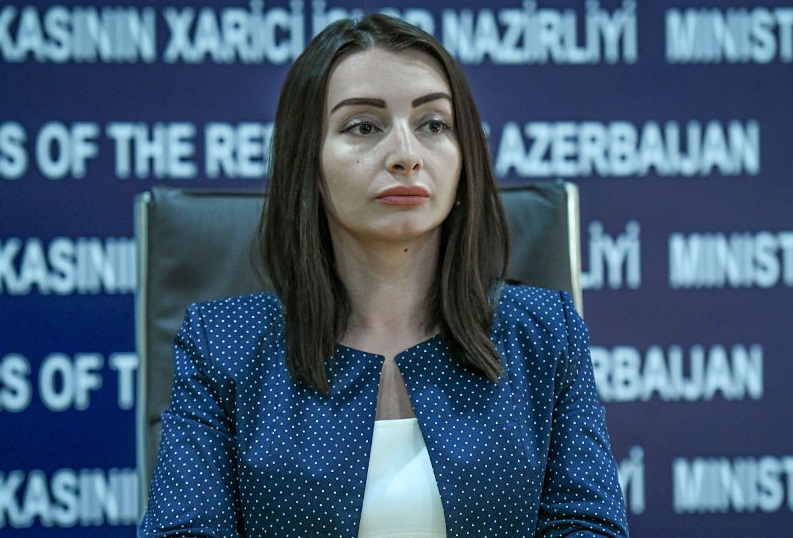Russian Foreign Minister Sergey Lavrov’s latest remarks on the settlement of the longstanding conflict between Azerbaijan and Armenia over the Nagorno-Karabakh region were met with a reaction in Azerbaijan.
During his trip to Yerevan this week, Lavrov met with Armenian government officials, including his counterpart Zohrab Mnatsakanyan, with whom he held a press conference. Asked whether representatives of the unrecognized regime in the Nagorno-Karabakh region should have a seat at the negotiating table, Lavrov said only parties themselves can decide this.
“The parties themselves must agree and determine the composition of the participants of negotiations,” the Russian diplomat said Monday.
According to the existing format of negotiations, Azerbaijan and Armenia are the only parties to the negotiations that are held under the auspices of the OSCE Minsk Group co-chaired by Russia, the United States, and France.
"It is clear to everyone that without the consent of the people of Nagorno-Karabakh, the population of Nagorno-Karabakh, it will be impossible to draw up any agreements,” Lavrov added.
Leyla Abdullayeva, a spokesperson for Azerbaijan’s foreign ministry, said the conflict cannot be resolved without the participation of the Azerbaijani community that once inhabited the region.
“The Azerbaijani community of the Nagorno-Karabakh region of our country is an integral part of any plan to resolve the Armenian-Azerbaijani Nagorno-Karabakh conflict,” Abdullayeva said in a statement released by the ministry.
“We have repeatedly stated that only the return of Azerbaijani internally displaced persons to their homes can create real opportunities for resolving the conflict on the basis of the high status of self-government within the framework of the territorial integrity of Azerbaijan, providing for the joint residence of both communities in peace and security,” she added.
Sergey Markov, a Russian political scientist and journalist, agrees.
“In response [to Lavrov’s statements], Baku rightly stated that besides the Armenian community of Karabakh, there is the Azerbaijani community, which in this case should take part in the negotiations,” Markov said in an interview with Media.Az.
“The principles of international law require this because the negotiation process should not legitimize the results of ethnic cleansing. And in Karabakh, only the Armenian community remained, while Azerbaijanis were expelled as a result of ethnic cleansing,” he said.
Located in the western part of central Azerbaijan, the Nagorno-Karabakh region was historically populated by ethnic Azerbaijanis. The Russian empire relocated Armenians from Anatolia and Iran to the historical Azerbaijani lands, starting as early as in the 19th century. Before the conflict between Armenia and Azerbaijan erupted in the late 1980s, during the twilight of the Soviet Union, the percentage of Azerbaijanis and Armenians living in the Nagorno-Karabakh Autonomous Region of the Azerbaijan SSR amounted to 25 and 75 percent, respectively.
Following the Soviet Union’s dissolution in 1991, Armenia kicked off a military campaign against Azerbaijan to occupy the region, which sparked a bloody war that lasted until a ceasefire in 1994. But by then the region, along with seven surrounding districts, had been occupied by Armenia. The entire Azerbaijani population – approximately one million – was expelled from the Nagorno-Karabakh region and seven surrounding districts of Azerbaijan. More than 30,000 Azerbaijanis were also killed.
The parties to the conflict have failed to agree to a settlement over the last quarter of a century, and negotiations have been ongoing for more than 25 years. Despite four United Nations Security Council resolutions calling for the Armenian military’s full withdrawal from the occupied areas, they go unfulfilled.







 The number of evacuees from flooded areas in Kazakhstan has reached 97,852 people, including about 32,856 children since March 27.
The number of evacuees from flooded areas in Kazakhstan has reached 97,852 people, including about 32,856 children since March 27.
 The Islamic holy month of fasting, Ramadan comes to an end this week with the celebration of a joyous festival called Eid (meaning “festival” in Ar...
The Islamic holy month of fasting, Ramadan comes to an end this week with the celebration of a joyous festival called Eid (meaning “festival” in Ar...
 Iran's senior military leaders described the drone and missile attack on Israel on April 14 night as “successful".
Iran's senior military leaders described the drone and missile attack on Israel on April 14 night as “successful".
 Iranian President Ebrahim Raisi warned Israel that it would face a "real and extensive" response if it makes any "mistake" following Tehran’s missi...
Iranian President Ebrahim Raisi warned Israel that it would face a "real and extensive" response if it makes any "mistake" following Tehran’s missi...



